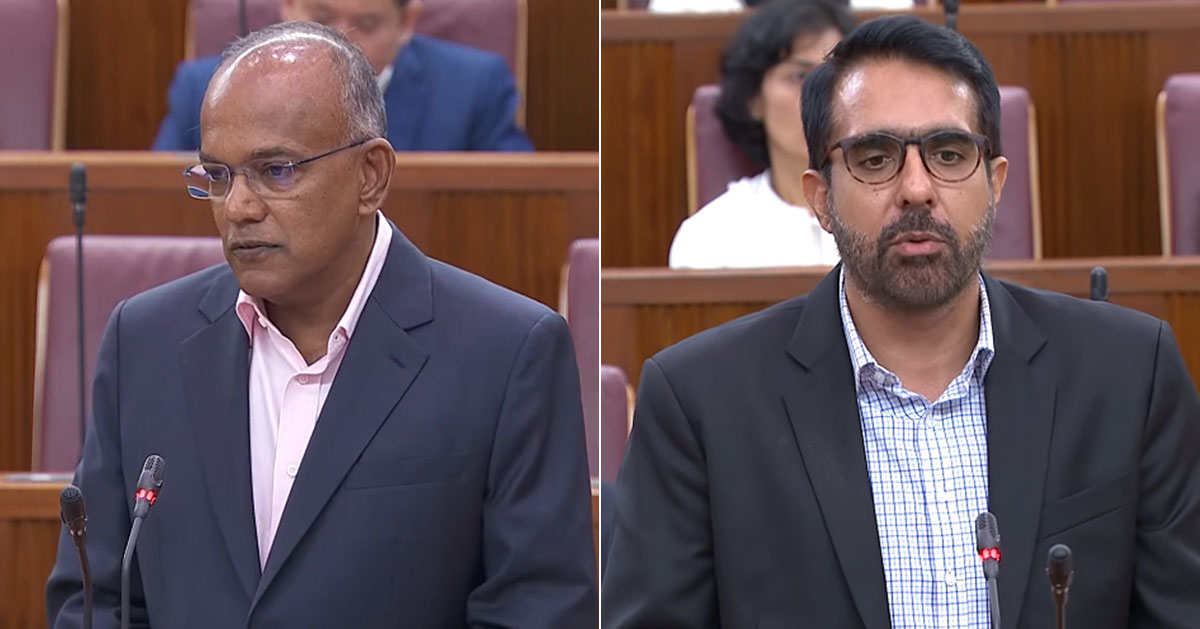Home affairs minister K Shanmugam said on Monday, March 1, that the suggestion to offer discounts on traffic fines can be considered.
This issue was raised by Workers' Party chief Pritam Singh, and addressed by Shanmugam during the committee of supply debate in Parliament.
Pritam said that while composition fines have increased from S$70 to S$100 and S$100 to S$150 for a variety of traffic offences even as they serve as a deterrence, they affect low income road users more as they cannot afford to pay such hefty penalties at one go.
"Those most heavily affected by the new high fines are taxi and private hire car drivers, motorcycle couriers, and the low income, who may not have the ability to pay such a large sum of money at one go," Pritam said.
"I would like to request the ministry to consider the option of offering an automatic instalment plan for comparatively minor offences that do not attract a custodial sentence on the condition that the offender undertake not to commit a civil offence, failing which, no instalment plan will be offered as of right."
Pritam added that many of the residents he sees who are on the receiving end of these new fines admit to the offenses and are usually contrite.
Discounts for demerit points already implemented
In response to the suggestion of instalment payments, Shanmugam said motorists who cannot afford the fines will be assessed on a case-by-case basis by the Traffic Police.
Even though discounts have not been applied to fines yet, calibrating penalties to be more lenient have been implemented for the demerit points system, Shanmugam said.
This scheme is currently available for eligible drivers who accumulate at least one-third of the maximum allowable demerit points to undergo a safe driving course.
"Upon completing the course, four demerit points will be expunged from the driver's record", Shanmugam said.
Full exchange between Pritam and Shanmugam here:
Pritam:
Generally, for example, the fines for illegal U-turns, while attracting zero demerit points, were raised from S$70 to S$100, while the heavy vehicle drivers saw the composition sum for the same offence increased from S$100 to S$150.
In fact there was an increase in the compensation fines for all offences that attracted fines up to 12 demerit points.
For offences that attracted at least 12 demerit points which could manifest, for example, in a failure to conform to a red light signal, the composition fine has been doubled from S$200 to S$400.
While heavy vehicle drivers have seen that same offence have seen a jump in the same offense from S$230 to S$500, and so far as the fine amount is concerned.
So I agree that road safety is something we cannot compromise upon and the need for deterrence is obvious.
However, many of the residents I see who are on the receiving end of these new fines, admit to the offenses and are usually contrite.
In most cases, there is no question of actual harm caused because that would attract more severe penalties, anyway.
Those most heavily affected by the new high fines are taxi and private hire car drivers, motorcycle couriers, and the low income who may not have the ability to pay such a large sum of money at one go.
In the appropriate case I would like to request the ministry to consider the option of offering an automatic instalment plan for comparatively minor offences that do not attract a custodial sentence on the condition that the offender undertake not to commit a civil offence, failing which no instalment plan will be offered as of right.
This approach seeks to retain the deterrence and policy objective of higher fines. Some jurisdictions around the world even offer to halve a fine provided it is paid forth with.
Such a proposal can be modified with for better policy outcomes, for example, with a requirement for some retraining or refresher defensive driving courses.
I hope the minister, and for first the first time offenders only, I hope the ministry can consider such alternatives that achieve the objective of increased road safety awareness and deterrence on the one hand, and reasonable consideration for the financial consequences on frequent, usually low income road users, on the other.
Shanmugam
We amended the Road Traffic Act in 2019 to increase deterrence against irresponsible driving.
Pritam Singh asked whether road traffic fines can be paid in instalments, and whether a one-time discount on points and penalties can be offered for low-income road users.
We start with the basic principle.
Traffic rules are enforced for all motorists, because the law must be administered equally and fairly.
For genuine cases of financial difficulty, the Traffic Police will assess appeals on a case-by-case basis.
Something we can consider is the other suggestion to offer discounts on fines to first-time offenders subject to conditions.
There is a similar approach for demerit points but not for fines.
The Traffic Police offers a safe driving course for eligible drivers who accumulate at least one-third of the maximum allowable demerit points.
Upon completing the course, four demerit points will be expunged from the driver's record.
If you like what you read, follow us on Facebook, Instagram, Twitter and Telegram to get the latest updates.
